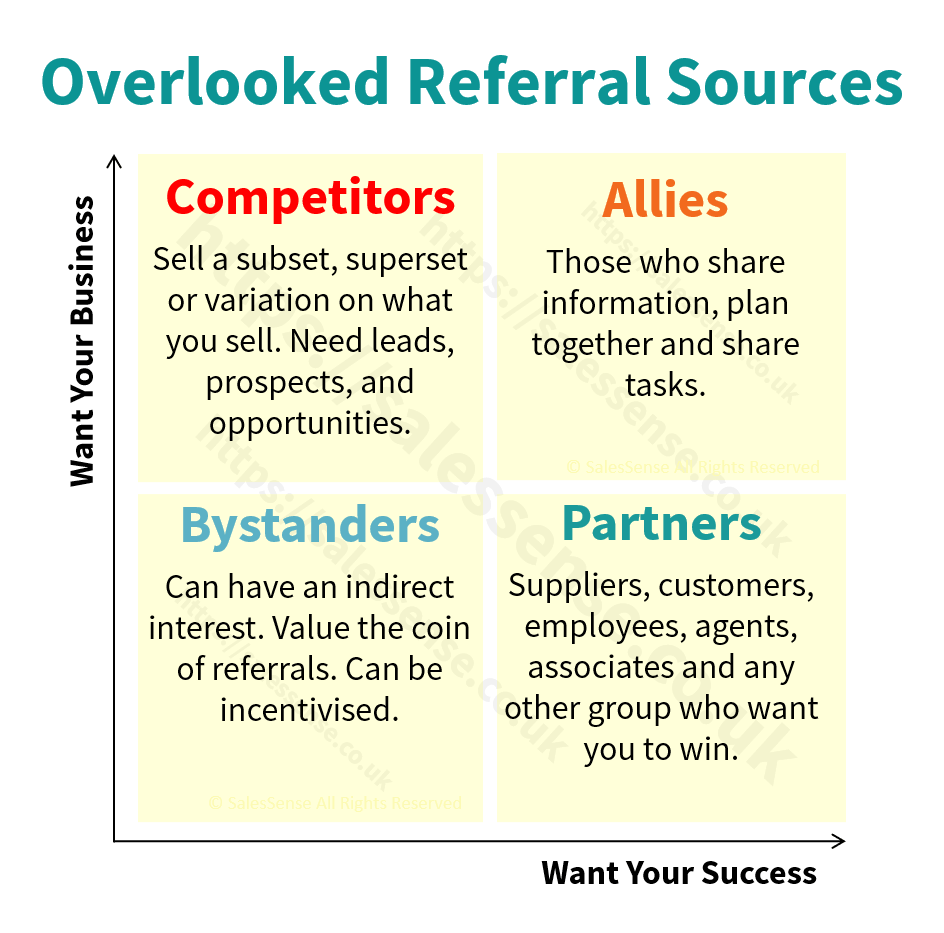Use this approach to get competitor referrals.

Do you have a list of opportunities that you failed to sell and who bought nothing? A list of suspects that are of no use to you that could be traded for competitor referrals?
If you don't have such a list, it is past time to start compiling one.
Just because you failed to persuade them to buy doesn't mean they will never buy.
Of course, you could keep such a list to yourself and call on those same people again, perhaps every six months or so to see if anything has changed.
Or you could trade some of those on your list for some of those on competitors' lists.
Just because a prospect didn't buy from a competitor doesn't mean they will not buy from you.
Admittedly, such an exchange depends on a degree of trust between competitors.
Many of the people you would need to speak with are already in your social network!
What have you got to lose?
Start by calling your counterparts in competitor organisations to explore the idea.
Guide for Getting Competitor Referrals
Asking for referrals from competitors might seem an unlikely strategy, yet it can be hugely effective, especially in industries where specialisation varies, or when companies need to offload overflow work. Here’s a comprehensive guide to help you use this approach:
1. Identify Competitors
Direct Competitors: Those offering similar products or services to the same target market.
Indirect Competitors: Those serving the same target market but with different products or services.
Analyse Specialties:
Complementary Services: Look for areas where your services complement rather than directly compete with theirs.
Specialisation: Identify areas where your company specializes in a niche that your competitors do not.
2. Build Relationships with Competitors
Networking Events: Attend conferences and trade shows where competitors are present. Participate in local chamber of commerce events or industry-specific meetups. Join industry associations where competitors are also members. Consider volunteering for committees or boards where you can build deeper connections.
3. Offer Value to Competitors
Reciprocal Referrals: Establish a mutual referral agreement where you refer clients to each other based on specialities and capacity. Offer to take on overflow work your competitors can’t handle, ensuring they maintain their client relationships.
Collaboration Opportunities: Propose joint ventures or partnerships on larger projects where both companies can benefit. Offer your services as a subcontractor for specific projects that fit your expertise.
4. Communicate Your Unique Value Proposition
Highlight Specialisations: Emphasize areas where your expertise surpasses theirs or where you offer unique solutions. Share case studies demonstrating successful outcomes in your specialised areas. Use testimonials from satisfied clients in niche areas to build credibility. Provide detailed portfolios showcasing your best work in areas where competitors may not have the same depth of experience.
5. Establish Trust and Credibility
Transparent Communication: Engage in open and honest discussions about areas of strength and potential collaboration. Set clear terms for referrals and collaborations to avoid misunderstandings.
Professionalism: Ensure that any referred clients receive the highest quality of service, reflecting well on the referring competitor. Keep competitors informed about the progress and outcomes of referred clients to maintain trust.
6. Create a Referral Programme Specifically for Competitors
Offer incentives such as referral fees, discounts, reciprocal referrals, or a combination. Simplify the referral process with clear guidelines and dedicated points of contact. Create a section on your website for competitor referrals that outlines the benefits and procedures.
keep referral partners updated on your capabilities and success stories through email or newsletters. Engage with competitors on professional social media platforms like LinkedIn to build rapport and visibility.
Sample Email Template for Competitor Referral Request
Subject: Let's Help Each Other Grow
Hi [Competitor’s Name],
I hope this message finds you well. I’ve been following [Competitor Company Name] for a while and have great respect for the work you do in [specific area].
I want to suggest an idea that could benefit both our companies.
We often come across clients looking for [specific service your competitor offers] which isn’t our core speciality. I was wondering if we could establish a referral relationship where we refer clients to each other based on our specialised services.
For example, we specialise in [your speciality], and I believe there might be opportunities where our expertise could complement your services. In return, we'd be happy to refer clients looking for [competitor’s speciality] to you.
Would you be open to discussing this further? I believe this could be a win-win for both our businesses.
Looking forward to your thoughts.
Best regards,
[Your Name]
[Your Position]
[Your Company]
[Contact Information]
7. Leverage Technology
Use your CRM system to track referrals from competitors and ensure timely follow-ups. Consider using referral platforms that automate the referral process and provide transparency for both parties.
Communication Channels:
Competitor referral exchange programmes are a little-used means of strengthening professional networks, broadening perspectives, and generating new business. Use this guide to create your own competitor referral programme.
This is the fourteenth of 17 referral prospecting methods shared on this site. See the others here.
If you want to get competitor referrals or introductions from other sources, we can help. Call +44 (0)1392 851500. Alternatively, use the contact form here or send an email to jimm@salessense.co.uk.












